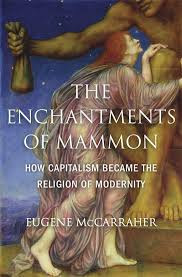Keeping to the promise I made in my March blogpost about Eugene McCarraher and his 2019 masterpiece, The Enchantments of Mammon, here is a summary of the Professor's main points in the first of the seven parts of his monumental work. Part One (pp.19-106) is called: The Dearest Freshness Deep Down Things: Capitalist Enchantment in Europe, 1600-1914.
 |
| McCarraher's 2019 masterpiece |
- The age of capitalist enchantment began in England in the 16th and 17th centuries. A capitalist vanguard of landowners and merchants blazed a trail of 'improvement' that swept away the ties of common-land holding that had been blessed by the medieval church. Puritan improvers had a Protestant ethic that was perfectly compatible with omens and portents and matters of the Spirit. The metaphysical enchantments of medieval Catholicism were reworked into the imperatives of Protestant dispossession and enclosure of land for profit - in the name of God.
- English Protestants such as Richard Baxter and John Locke developed a systematic theology of the divine right of capitalist property which still embraced the power of the sacred enchantments - although other Protestants such as Gerard Winstanley and the Diggers offered a radical
